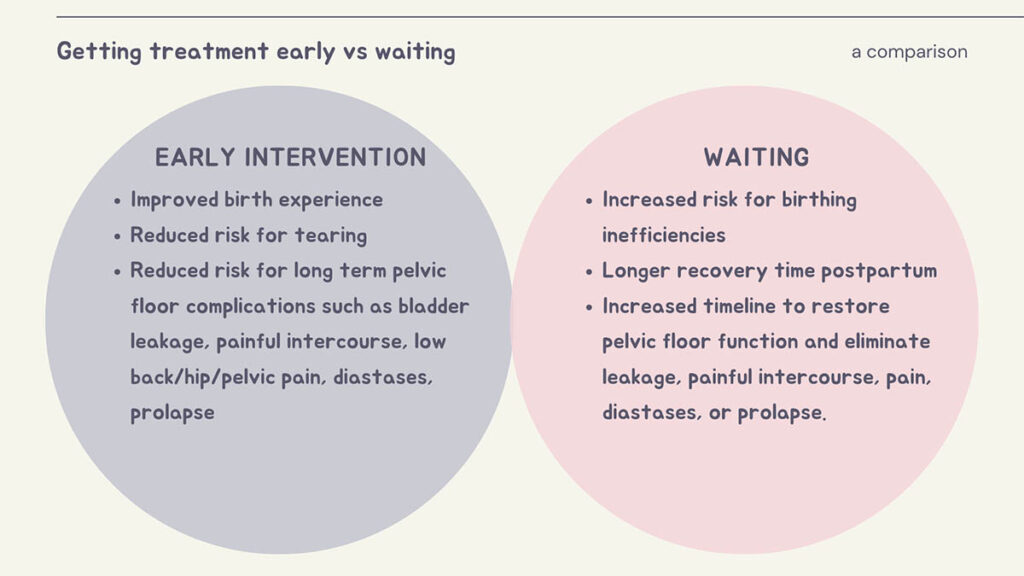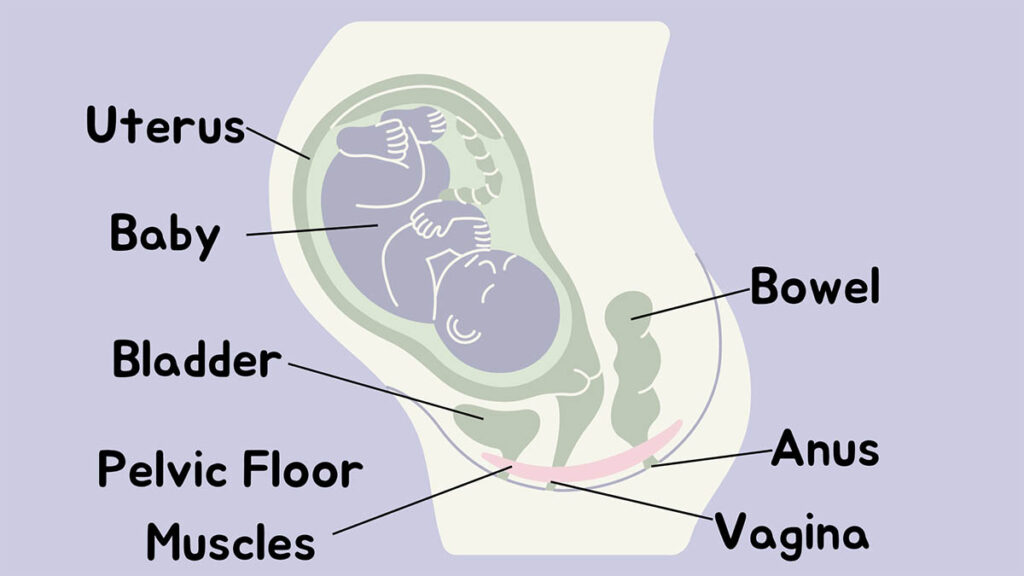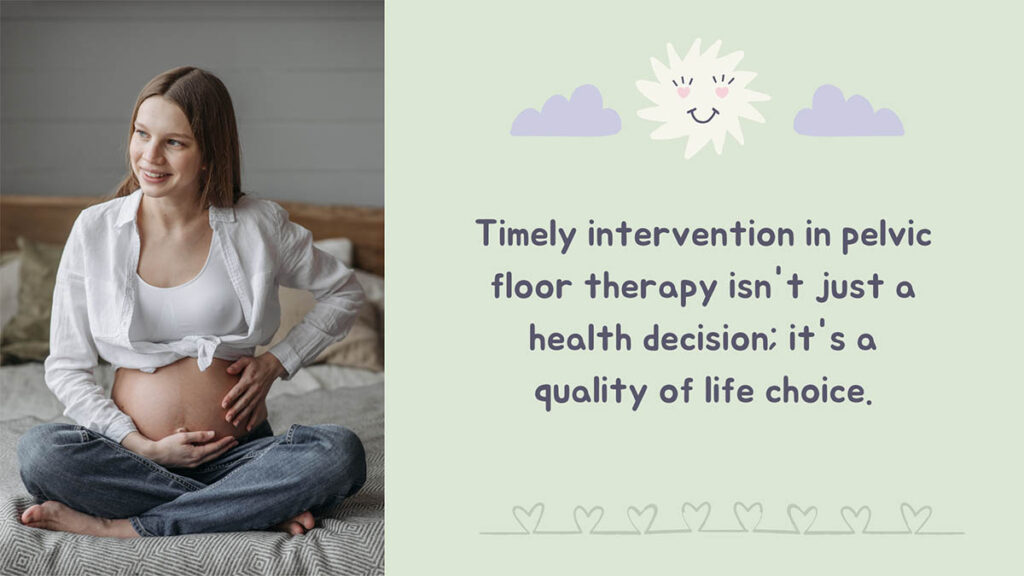Welcome to the transformative journey of motherhood—a thrilling and overwhelming adventure! As you prepare for or recover from this significant life event, there’s one crucial area that demands attention: your pelvic floor.
But what exactly is the pelvic floor? Think of your pelvic floor as a trusty hammock, supporting everything from your bladder to your bowel. It’s essential for maintaining control over your bodily functions and for supporting your body during and after pregnancy. Despite its importance, it often doesn’t receive the attention it deserves until problems arise. This is an unfortunate reality that should not be experienced by any woman, especially since there are a lot of things that you can do to prevent problems from happening.
Here at Vitality Pelvic Health, we specialize in postpartum pelvic floor therapy, not just because we know a lot of women need it, but because we know you deserve a healthy body for all the sacrifices that you make in being a mother. Whether you’re expecting your bundle of joy or navigating life postpartum, starting postpartum pelvic floor therapy early can significantly improve your quality of life. Let’s dive into why doing prenatal postpartum pelvic floor therapy sooner rather than later, is a game-changer for both your prenatal and postpartum experience.

The Timely Importance of Pelvic Health
Embarking on the journey of motherhood is akin to setting sail on uncharted waters. It’s thrilling, overwhelming, and transformative. However, amidst the anticipation and joy, the health of a crucial, yet often overlooked, part of your body—the pelvic floor—plays a pivotal role. This article delves into the significance of timely pelvic floor physical therapy during the prenatal and postpartum periods and why procrastination could be a hidden adversary in your path to recovery and long-term wellness.
The Pelvic Floor: Your Body’s Unsung Hero
Before diving into the why, let’s set the stage by understanding what the pelvic floor is and does. This network of muscles stretches like a supportive hammock from the pubic bone to the coccyx, cradling your bladder, uterus, and bowel. It’s instrumental in maintaining continence (keeping pee and poo where it’s supposed to be), supporting pregnancy, facilitating childbirth, and contributing to sexual function. When these muscles are weakened or damaged—be it due to pregnancy or childbirth—the repercussions can ripple through your quality of life.

The Case for Timely Intervention
- Prevention Is Better Than Cure: Prenatal pelvic floor therapy isn’t just about addressing problems; it’s about prevention. Strengthening these muscles before childbirth can reduce the likelihood of incontinence, pelvic pain, and prolapse post-delivery. It’s about setting a foundation of strength and resilience for the challenges that childbirth may bring.
- Postpartum Recovery: The postpartum period is often dubbed the ‘fourth trimester’ for a reason—it’s a critical phase for recovery and adaptation. Delaying therapy can exacerbate issues like pain, incontinence, or sexual dysfunction, turning what might be a temporary discomfort into a chronic condition. And you might be thinking “am I too far postpartum to receive treatment?”. The answer is NO! Once postpartum, always postpartum.
- The Domino Effect: Untreated pelvic floor issues can lead to a cascade of problems—back pain, sexual discomfort, psychological stress, and even social frustration due to incontinence. Ever find yourself looking for the nearest bathroom or “just in case” peeing? Early intervention can halt this domino effect, paving the way for a smoother recovery.
- The Psychological Angle: The emotional and psychological toll of pelvic floor issues is substantial. The stress of dealing with incontinence or pain can be a thorn in the joy of motherhood. Timely therapy can mitigate these issues, enhancing your overall well-being.

Why Waiting Isn’t Wise
- Long-Term Complications: Delaying treatment can lead to long-term complications like chronic pain, persistent incontinence, diastases, even prolapse, which might require long term therapy if gone untreated.
- Recovery Time: The longer you wait, the longer the recovery path may be. Early intervention sets the stage for a quicker and more efficient healing process, helping you regain your strength and function sooner.
- Impact on Daily Life: Pelvic floor issues can affect your ability to exercise, engage in sexual activity, and even perform everyday tasks. Timely therapy can help you return to your normal activities with confidence and comfort.
Embracing Timely Care with Vitality Pelvic Health
At Vitality Pelvic Health, we understand the nuances of prenatal and postpartum pelvic health. Our tailored therapy programs are designed to support your journey through pregnancy and beyond, ensuring you have the strength, function, and confidence to embrace motherhood in all its glory. Don’t wait for the issues to dictate your life’s rhythm; take the baton and take charge of your journey with the proactive support of our expert team.
The Time to Act is Now
The journey of motherhood is filled with decisions, and how you care for your pelvic floor should be at the top of your list. Timely intervention in prenatal and postpartum pelvic floor therapy isn’t just a health decision; it’s a quality of life choice. Embrace this period with the care, attention, and support it deserves, ensuring a stronger, happier, and healthier you for all the precious moments yet to come.

